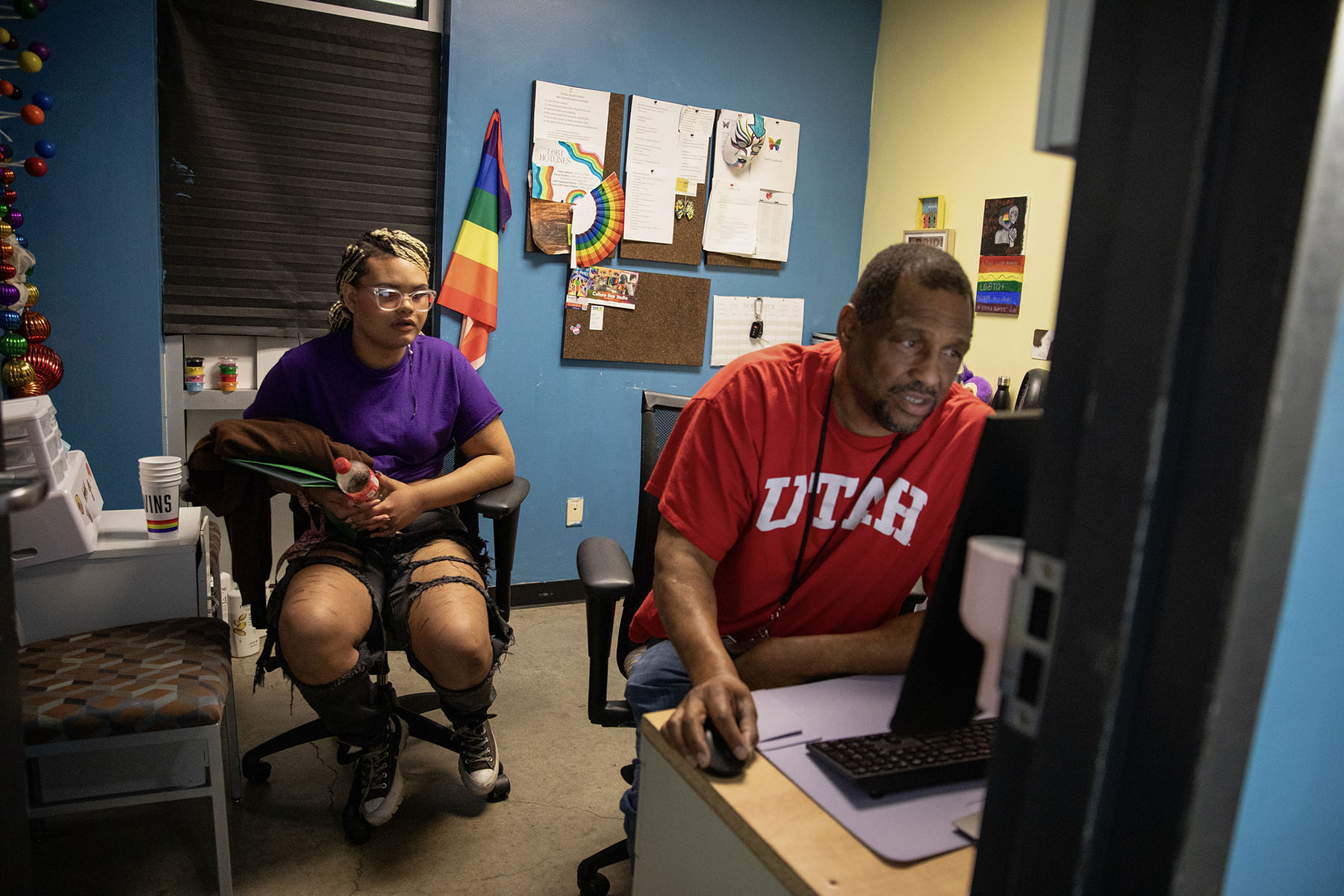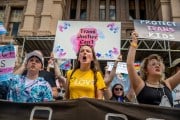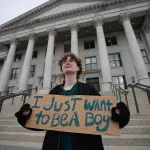It was near midnight just a couple days before Thanksgiving 2020 when 17-year-old Kayden Asher arrived at yet another temporary home during his yearslong tumble through Texas’ chaotic foster care system.
His caseworker had given him just two hours to pack his bags before they drove into the night from a short-term shelter in South Texas to a nondescript building in Austin where foster kids in need of emergency shelter can live temporarily. When Asher arrived, the staff pulled him aside to ask some questions.
“What are your pronouns? Do you feel safe talking about being trans around your caseworker?” Asher recalled them asking.
After his father effectively disowned him years earlier for being transgender, Asher shuffled between caseworkers and temporary guardians. Many of them also refused to accept his identity — until he moved to Austin.
“It was the first placement where I felt accepted, and I felt I belonged,” said Asher, now 20.
But in the years since Asher entered and exited the state’s care, LGBTQ+ foster kids have lost the little protections and affirmations once afforded to them as Texas’ top leaders waged statewide battles that riled public panic about queer people.
Studies show LGBTQ+ kids are more likely to become wards of the state compared with their straight and cisgender counterparts. It’s not difficult to imagine why. Many queer youth enter the system for the same reasons their peers do: abuse, neglect or a parent dealing with addiction. But many LGBTQ+ kids also get rejected by their parents or run away from hostile homes.
Yet Texas’ Child Protective Services doesn’t track the sexual orientation or gender identity of youth in foster care. And as state leaders prioritized legislating everything from transgender kids’ access to certain health care and the places drag queens can perform, they also quietly stalled efforts to better train adults charged with caring for trans foster youth.
“Right now the governor and the Legislature would like nothing better than to just be able to wash their hands of everything LGBTQ-related,” said Sharon Fonvielle-Baughman, who abruptly retired as the Department of Family and Protective Services’ special investigations director last year.
Transgender foster youth now find themselves simultaneously living in the care — and the crosshairs — of Texas’ conservative state government.
Republican Texas officials in recent years have introduced a litany of bills ensnaring how LGBTQ+ people live, saying they want to keep children from seeing lewd behavior in public, protect parental rights and prevent liberal indoctrination of kids.
Trans Texans, though, say those attempts further marginalize an already vulnerable part of the population. And for trans people who age out of the foster care system, that kind of stigma worsens an already tenuous struggle to build an adult life without the kind of familial, financial and social support upon which most young adults depend.
“Kids are not political pawns,” Asher told The Texas Tribune. “Kids should not be used to score political points, especially foster kids, because our lives are already crap.”
Texas has long struggled to turn around a foster system notoriously riddled with overmedication, neglect and abuse. A judge in 2015 determined Texas’ foster system leaves kids worse off than when they entered it, kicking off years of federal oversight that persists. The instability of growing up in such an environment increases the risks that people end up homeless, become victims of human trafficking and struggle to acclimate to typical adult life once they age out of foster care.
For trans kids who’ve been through the system, those odds only grow. Research has shown that LGBTQ+ foster youth are more likely to live in group home settings; frequently move between placements; report being hospitalized for emotional and physical reasons; and face mistreatment from peers and staff.
At DFPS, the state agency tasked with caring for LGBTQ+ kids, a hush-hush culture has now taken root and spread to organizations contracted to carry out its duties, according to several current and former agency staffers who asked that their identities be withheld because they fear losing their jobs or imperiling future opportunities to work in child welfare in Texas.
The culture of secrecy is only hurting LGBTQ+ foster children who have already experienced trauma before entering state care, said Krystal Mehrhof, a social worker with Central Texas Youth Services who works with homeless youth.
“You cannot come to a person who has this part of their identity that has substantially impacted their life and tell them, ‘Well we’re not going to talk about that,’” Mehrhof said. “You’re asking them to either hide or deny part of who they are.”
DFPS declined to respond to a list of questions for this story.
A cycle of chaos
Isabella Morningstar was 14 when her adoptive mother of nearly a decade refused to let the teenager continue living with her — a decision that kick-started a cycle of displacement. Over the following four years, Morningstar moved between over 20 placements: a foster home, psychiatric hospitals, emergency shelters and unlicensed facilities.
Staff at those placements often refused to call Morningstar by her preferred name or allow her to wear feminine clothes. More than once, she was kicked out of group homes for expressing her gender identity.
“Once I figured out I’m trans, I was like, ‘I’m not going to hide who I am just to please y’all. I don’t care if I’m in CPS,’” Morningstar said in a recent interview. “I’m still the same person I was yesterday. I’m still the same person I am today.”
But Morningstar rarely encountered acceptance in foster care. She recalls one staff member at an Amarillo facility telling her “that I would end up on the streets or I’m gonna end up laying on my back for money, or dead.”
Over the next four years, the vitriol from adults who were supposed to provide a safe and stable home conditioned Morningstar to expect people around her would put in little effort to understand her.
One facility in Houston refused to let Morningstar get her hair styled in the same way cisgender girls did. She was kicked out of homes for dressing femininely or having relationships with other adolescents living at placements, even though such romances were common — but not cause for discipline — for cisgender youth.
- In November, Morningstar woke up early to get ready for the day. Before enrolling in a cosmetology program at Palo Alto College in San Antonio, she needed to submit documentation to qualify for a scholarship. Foster youth in Texas are eligible for tuition waivers at select state colleges.
-
Morningstar puts the final touches on her makeup before leaving Thrive Youth Center in San Antonio. She wanted to be comfortable in her gender expression for her first trip to Palo Alto College in November. While she was in the care of the Texas Department of Family and Protective Services, she wasn’t allowed to wear makeup or feminine clothing.
(Greta Díaz González Vázquez/The Texas Tribune)
While in the state’s care, Morningstar received diagnoses for bipolar disorder and depression, which she took medication to treat. But she recalls being given so many pills at one time that the medications made her lethargic.
“The staff didn’t want to deal with us so they put us on a whole bunch of drugs, so we were quiet,” Morningstar said.
The improper distribution of psychotropic drugs has been an ongoing component of a 13-year-old lawsuit against the state for violating the constitutional rights of foster children by exposing them to an “unreasonable risk of harm.”
Last week, a federal judge fined the Health and Human Services Commission, which oversees DFPS, $100,000 per day in fines for neglecting investigations into allegations of abuse of children in foster care. An appeals court blocked the fine, but it was the third time the state has been found in contempt over foster care conditions since 2011.
During a hearing last year, watchdogs appointed by a federal judge found that residential facilities — like the ones Morningstar lived in — failed to follow the state’s guidelines for administering drugs and gave medications to minors that aren’t recommended to children.
Residential facilities are designed for youth with greater behavioral needs, like therapy and medication, and are more restrictive places compared with private foster homes. Even more confining are unlicensed homes like office buildings or hotels where youth with no permanent placement are sent to sleep.
Based on conversations with 10 caseworkers, lawyers and advocates for foster youth who currently or formerly worked in Texas, LGBTQ+ kids are overrepresented in unlicensed homes because less restrictive placements can’t meet the needs of these young people who are trying to carve out their identities.
- Morningstar speaks with Jai Gonzalez Quintero, a case manager at Thrive Youth Center in San Antonio, before leaving for the day. The nonprofit provided educational and career support to Morningstar, along with practical resources like bus passes.
-
Morningstar, 22, poses for a portrait in her room at Thrive Youth Center in San Antonio. Morningstar realized she was transgender while she was in the state’s troubled foster care system. “I’m not going to hide who I am just to please y’all. I don’t care if I’m in CPS,” she said.
(Greta Díaz González Vázquez/The Texas Tribune)
Denise, a Houston-based DFPS caseworker who asked that her full name not be used because she fears retaliation, observed firsthand how rejection from foster families and other adults tasked with caring for LGBTQ+ youth resulted in behavioral issues. She said those youth often say disrespectful, hurtful things and try to intimidate adults supervising them. She said that same behavior prevents the kids from being able to find a permanent home within the foster system.
“When youth are misunderstood, they become extremely disrespectful because that’s the only power that they have, it’s their only area of control,” Denise said.
Falling dominoes
Growing up in Beeville, a small town outside Corpus Christi, Asher and his family knew everyone in their tight-knit, Christian community.
That made it all the more difficult to keep secrets from others in town. Asher realized he was transgender when he was 13. His mom wasn’t in the picture and he tried to hide it from his dad at first, but it continued gnawing at him until he couldn’t keep it inside any longer.
When he told his dad, the response was jarring.
“He was like, ‘Don’t tell anyone, absolutely not. Don’t tell your brother. Don’t tell anyone,’” Asher said.
Asher’s dad refused to come to terms with the fact that he had a trans son. Their relationship fell apart, and Asher’s mental health deteriorated with it.
Thoughts of self harm got so bad, Asher went to a psychiatric hospital. A doctor observed that Asher wasn’t depressed or threatening to harm himself when he was away from home.
“CPS finally took me because my dad refused to have me at home,” Asher said. “And I refused to go home.”
As Asher was waking up to his identity, politicians in Austin were learning more about the transgender community. Two years prior to Asher leaving home, lawmakers tried to restrict the public bathrooms trans people can use.
The measure didn’t pass in part because former Texas House Speaker Joe Straus, a Republican, opposed the measure. But legislators did pass a law allowing religious organizations that contract with the state to refuse to work with LGBTQ+ couples who are seeking to foster or adopt. The legislation was part of a broader effort to fill gaps in the foster care system with the help of faith-based institutions.
That same year, DFPS quietly altered their Foster Care Bill of Rights, a document outlining how children should be treated in the state’s care. The agency, whose top official is appointed by the governor, removed mentions of protections specific to gender identity and sexual orientation. Now, Texas’ list of rights for foster youth states all children will be “treated fairly.”
“I think that’s where the dominoes started to fall, I think that’s really where you started to see an active attack on LGBTQ identity,” said Will Francis, the executive director of the Texas and Louisiana chapters of the National Association of Social Workers.
- Morningstar looks at the bus route on her phone outside a car dealership. Morningstar learned that traveling around San Antonio using public transit can take hours longer than driving. She took two buses and walked for 50 minutes to get to her college.
-
Morningstar drops off her documentation at Palo Alto College’s financial services office. She has had to jump through multiple hoops to access financial support as a former foster youth because her paperwork was under her name given at birth and not her current legal name.
(Greta Díaz González Vázquez/The Texas Tribune)
When Asher entered the state’s care, like Morningstar, he cycled between foster homes, psychiatric hospitals and residential treatment centers. More often than not, he found himself in situations where foster families and staff refused to call him by his preferred name or acknowledge his trans identity.
“I think my biggest challenge while I was in care was being listened to and being understood. Nobody wants to listen to you,” Asher said.
He said that was especially true of the faith-based placements that pushed church attendance on Asher and his peers.
That wasn’t the case at Lifeworks, the residential center in Austin where Asher was taken around Thanksgiving in 2020. When another foster kid bullied Asher for being trans, the staff immediately addressed the incident. He was also connected with a clinic where he could begin the process of medically transitioning through the use of hormone treatment.
But while Asher was settling into his new life in Austin, lawmakers returned to the Capitol for the 2021 legislative session. They tried unsuccessfully to ban transition-related care for adolescents or classify it as child abuse. Social workers rallied against the bill that tried to label such care as child abuse, arguing that it would remove transgender children from their homes and force them into the foster care system.
Many trans people experience gender dysphoria, a dissociation between one’s sex assigned at birth and their gender identity. Transition-related care (also called gender-affirming care) is a broad term referring to a range of social behaviors, mental health care and medical therapies that treat gender dysphoria and support a person’s gender identity.
The American Academy of Pediatrics says the some medical transition-related care can reduce distress in some transgender youth, who face higher rates of suicide attempts and mental health problems than their cisgender peers. And medical professionals say trans kids are only provided access to puberty blockers or hormone therapy under the care of doctors and mental health care providers — and with the permission of their parents or legal guardians.
For Asher, a transgender teenager already in the state’s care, the legislative debates were perplexing. Two months before his 18th birthday, while still in state care, he began taking testosterone.
After the bills died, Attorney General Ken Paxton issued an opinion that transition-related surgery, and nonsurgical treatments such as puberty blockers and hormone therapy, should be considered child abuse.
Seizing on that, Gov. Greg Abbott directed CPS to investigate for child abuse the Texas parents with transgender children who were receiving gender-affirming treatment.
LGBTQ+ lawmakers requested to meet with then-DFPS Commissioner Jaime Masters over Abbott’s directive. But the agency was prohibited from answering lawmakers’ questions over the matter, according to internal emails. Agency leaders advised staffers not to put communications in writing and to only discuss intakes related to Abbott’s directive over the phone.
“No emails or texts allowed,” Patricia Salinas, then the Child Protective Investigations director for the agency, wrote to DFPS employees.
Also in 2021, former state Sen. Don Huffines was challenging Abbott in his upcoming reelection and attempted to out flank the incumbent on the right. Huffines blasted Abbott’s leadership by zeroing in on a DFPS webpage, titled Youth Connections, that provided information about a suicide prevention hotline, LGBTQ+ legal services, and questions about defining gender and sexual identity.
Inside the agency, staffers noted Huffines’ criticism was “starting to blow up” on social media. They quickly removed the Youth Connections website.
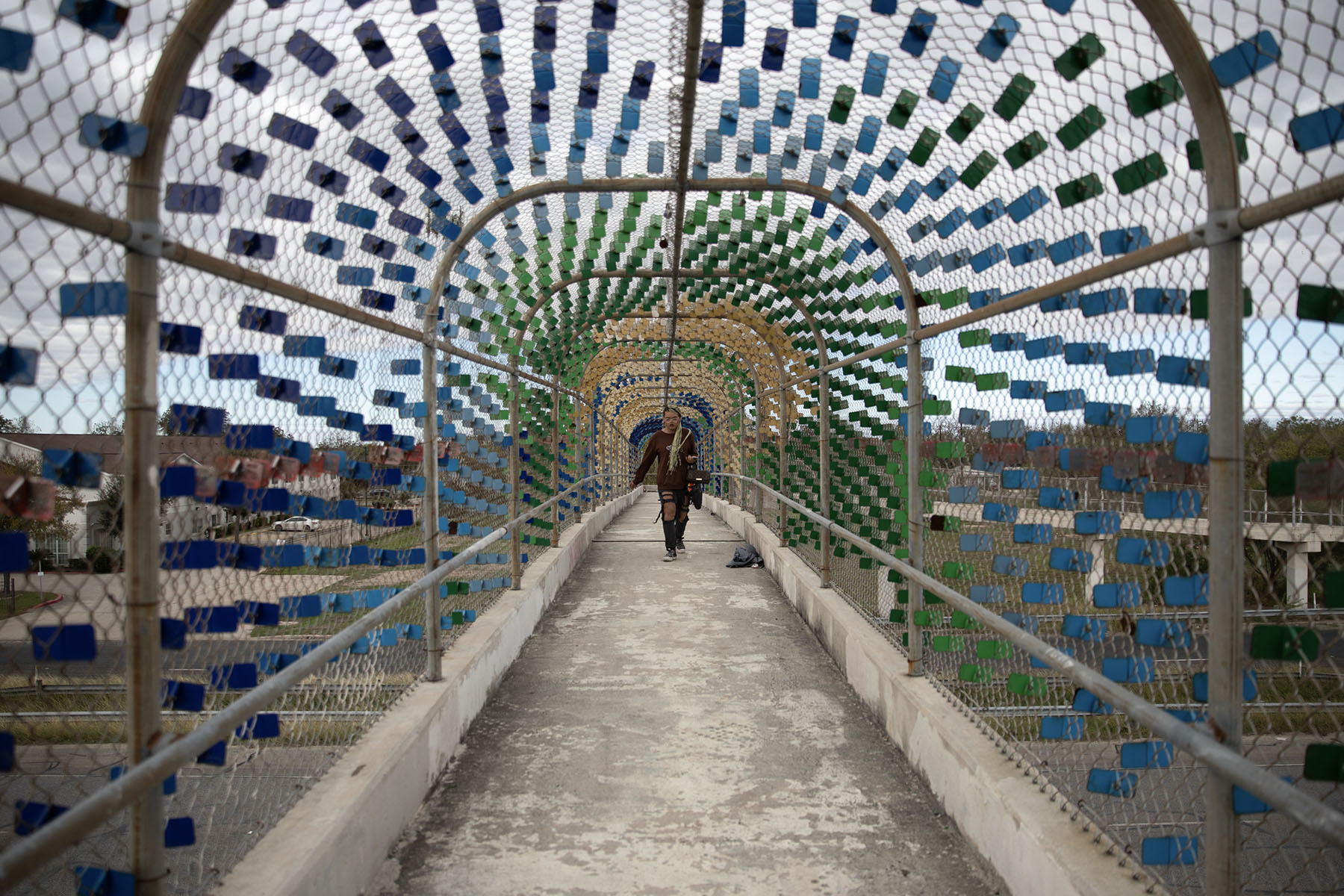
Aged out and alone
After Morningstar aged out of foster care in 2020, she struggled to find a stable place to live. She wanted to live on her own but couldn’t secure housing without help, so she moved in with her birth mom and stepdad in the Panhandle.
The brief period of stability went out the window after a few years due to mistreatment by her family forcing her to move out. She shuffled between temporary housing and hotels until last year, when she was connected to Thrive Youth Center, a nonprofit that provides housing for LGBTQ+ young people that helped Morningstar relocate to San Antonio.
“I wasn’t given any help when I aged out. I wasn’t given any phone number to help me at all,” Morningstar said. “It was just, ‘There you go, you’re not a part of CPS anymore.’”
Staying there meant she had a curfew and restrictions on what she could bring into the facility, like food and beverages. But workers provided educational and career support to residents, along with practical resources like bus passes.
About half of the youth that Thrive serves are former foster youth, Jenny Hixon, who ended her tenure as the nonprofit’s executive director last week, told the Tribune. She said many of the trans residents are skeptical of mental health services provided by the nonprofit because the therapists they were forced to see while they were wards of the state didn’t affirm their gender identities.
The youth Thrive works with, Hixon said, often bounced around institutions where they didn’t build a strong relationship with a primary caregiver, so many never learned basic skills needed to live independently.
“Nobody ends up on the street if they had a solid, great home environment,” Hixon said.
Despite not having that stable foundation, Morningstar is trying her best.
- Over the four years Morningstar was in the state’s care, she lived in over 20 different placements, including psychiatric hospitals and unlicensed facilities. Current and former caseworkers and lawyers who worked with foster youth told The Texas Tribune that LGBTQ+ kids are overrepresented in unlicensed homes because less restrictive placements often can’t meet the needs of these young people.
-
Morningstar stops at a convenience store to buy food before taking the bus. “I wasn’t given any help when I aged out. I wasn’t given any phone number to help me at all,” Morningstar said.
(Greta Díaz González Vázquez/The Texas Tribune)
One morning last year, she woke up at 5 a.m. to put on her makeup and get ready for the day. She wanted to look good and be comfortable in her gender expression for her first trip to Palo Alto College, where she will start a cosmetology program this summer.
She needed to provide the university with documentation to qualify for a scholarship. After two buses and a 50-minute walk to the college, Morningstar learned she could have just emailed the paperwork.
“We’re starting from the ground up with some of these kids, they don’t know how to use a can opener,” Hixon said. “Basic things that you would think most 18-year-olds would know, and they don’t know.”
An absence of training
As Republican lawmakers were wading into transgender politics roughly seven years ago, there was momentum among advocates who worked with foster youth to improve outcomes from LGBTQ+ adolescents in the state’s care.
Eight years ago, Denise, the Houston caseworker, received training on how to care for LGBTQ+ youth. She lauded the training — and hearing the experiences of transgender youth she worked with. Both helped her better understand trans kids, something she said is important so the youth can open up and build trust with the adult tasked with caring for them.
“And if that caseworker is not trained for that, oh my goodness, you can end up with a child on the streets … human trafficked, drug use, major depression,” Denise said.
For years, an assembly of child welfare stakeholders tried to get DFPS to approve a resource guide that would help adults learn how to better care for LGBTQ+ youth.
“You may have a home that is in flat tire Texas and doesn’t necessarily have a lot of experience working with a queer kid, and all of a sudden, they have a queer kid and want to be that supportive placement for them,” said Francis, the regional National Association of Social Workers leader who helped prepare the LGBTQ+ Child Welfare Resource Guide. “We wrote that because DFPS was doing nothing.”
In May 2020, the LGBTQ+ Child Welfare Workgroup — made up of social workers, lawyers and child advocates who work with Texas foster youth — sent Masters, the DFPS head at the time, a draft of the guide. But for over two years, the draft sat untouched. Stephanie Muth replaced Masters as head of the agency in November 2022. As far as Francis knows, the agency still hasn’t taken steps to approve the resource guide, even though there are similar guides for youth with disabilities or substance abuse issues.
DFPS declined to respond to a list of questions about the resource guide and other policies the agency has in place to train employees on how to work with LGBTQ+ kids.
- Morningstar and Anthony laugh together after she returns from a long day traversing San Antonio. After telling Anthony about her day, Morningstar said, “I did everything by myself, like a big girl.”
-
After a whole day out in the city, Morningstar finally makes it back to the dorms at Thrive. She said that during her time in the foster care system, she wasn’t allowed to be around other LGBTQ+ youth, but at Thrive Youth Center, she made good friends.
(Greta Díaz González Vázquez/The Texas Tribune)
And it’s evident that providers aren’t eager to take a public stance on how best to care for foster kids who are LGBTQ+. Of the seven providers tasked with managing child welfare for regions of the state — as part of Texas’ most recent effort to overhaul the foster care system — only three provided a comment on the issue. Only one of those mentioned the presence of LGBTQ+ adolescents in their care.
“We prioritize the inclusivity of all the youth under our care, including those who identify as LGBTQ+,” Denny Marlin, the executive director of marketing and communications for Saint Francis Ministries, said in a statement.
Adam McCormick, an associate professor of social work at St. Edward’s University in Austin, has conducted hundreds of interviews with foster alumni. He said the state has systematically eliminated a support system for these kids who are already struggling with the pain of rejection from their families.
“I think that’s the biggest indictment of the Texas foster care system. LGBTQ young people are aging out of care and most of them do not even have a single person, let alone a robust support system, who they can count on,” McCormick said. “It is a type of loneliness unlike anything I’ve seen.”
Building a life
Once Asher turned 18, he left state care and moved into a shelter for young adults run by SAFE Alliance, a nonprofit that serves victims of abuse. In 2022, SAFE Alliance’s supervised independent living program helped him move into his own apartment.
It was there that Asher watched as lawmakers again targeted LGBTQ+ people — and made it illegal for trans kids to receive puberty blockers and hormone therapy. Despite pushback from several major medical groups, conservative legislators said the law was needed to protect children, whom they claimed were being influenced into receiving transition-related care.
While GOP officials in the state proudly stand behind the recent slate of bills targeting the LGBTQ+ community, Straus, the former House speaker who once helped stall such legislation, recently emerged as a lonely dissenter.
“Why is it such an obsession?” the Republican said in an interview at the LBJ School of Public Affairs earlier this month. “Time and time again, they try to find some niche thing they think will play well in the primary when, in my view, it’s rooted in just plain indecency.”
Asher said it’s become urgent for him to advocate for LGBTQ+ foster youth.
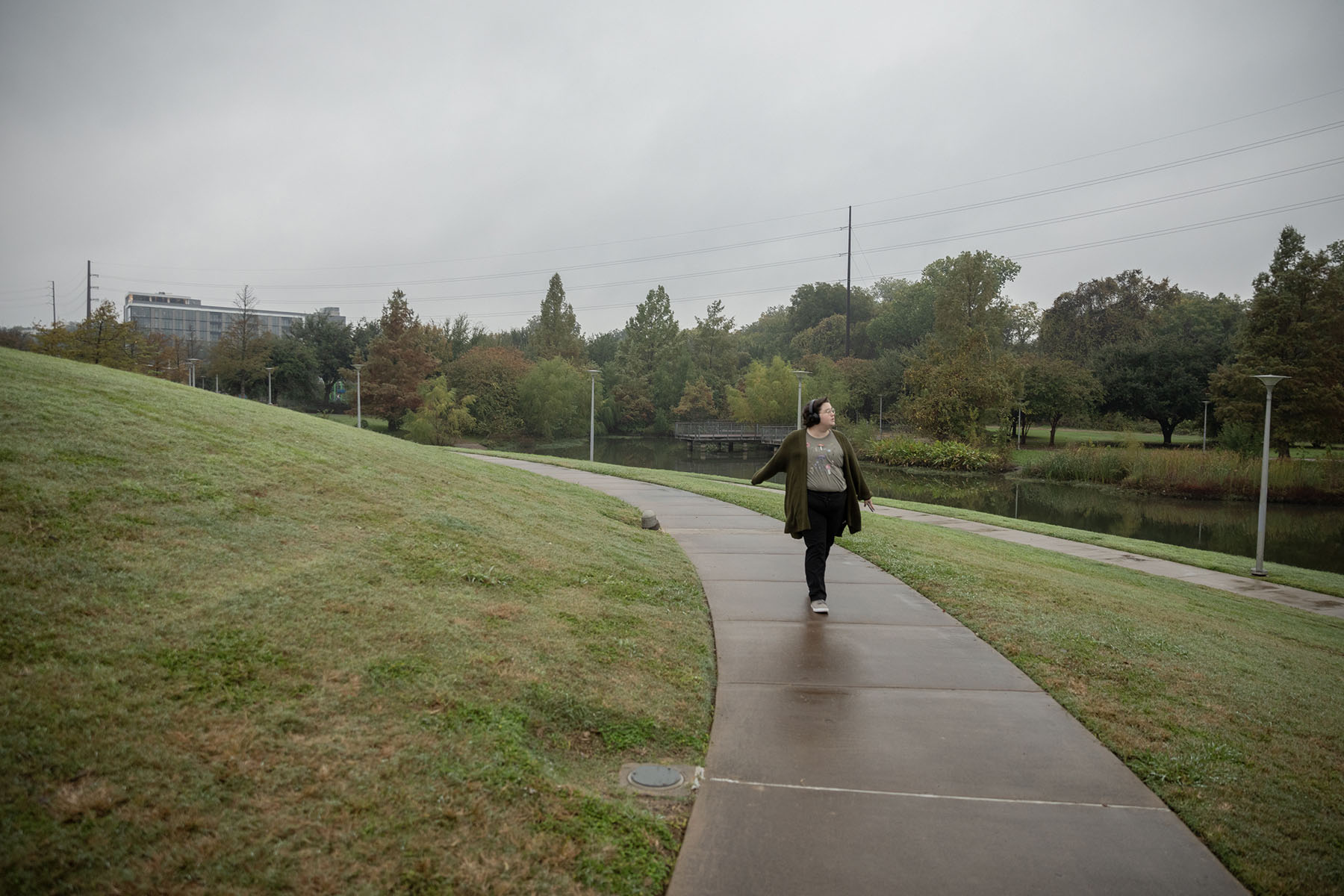
He pursued a degree in paralegal studies at Austin Community College, in part, because the program is approved by the American Bar Association, so he has a good chance of securing a full-time job after graduating in August. He wants to work with kids like himself, who are caught in the whirlpool of the Texas foster care system.
“Being a foster kid and being queer are both very big parts of my life,” Asher said. “And I want to work and help people in both of those situations.”
In February, Asher moved in with his new adoptive parents, whom he met while advocating for trans people at the Texas Capitol in 2021. He plans to stay with his adoptive family until he graduates. As Asher tries to figure out how to build a life — and help others — he holds tightly to a lesson he learned in the foster care system.
”You have to put yourself first because nobody else is going to keep you safe,” he said.
This article was co-published with The Texas Tribune. The Texas Tribune is a member-supported, nonpartisan newsroom informing and engaging Texans on state politics and policy. Learn more at texastribune.org.
This story was completed with the support of a fellowship from Columbia University’s Ira A. Lipman Center for Journalism and Civil and Human Rights.
Disclosure: University of Texas at Austin – LBJ School of Public Affairs has been a financial supporter of The Texas Tribune, a nonprofit, nonpartisan news organization that is funded in part by donations from members, foundations and corporate sponsors. Financial supporters play no role in the Tribune’s journalism. Find a complete list of them here.
